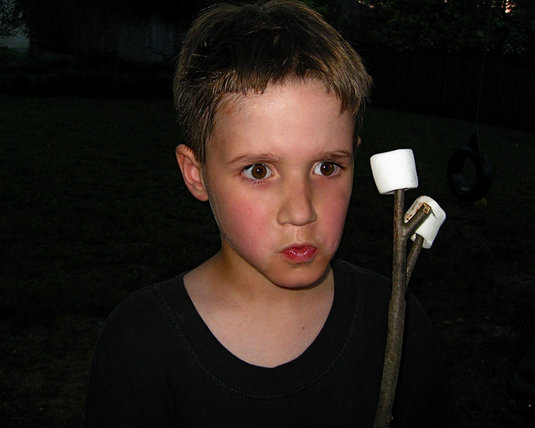
You can’t keep a kid from his marshmallow.
Back in the ’60s, it was apparently O.K. to torture little kids. Just kidding, but one study came close.
Here’s the gist. Stanford economists took four-year olds one at a time and put them in a room with a single marshmallow sitting on a table. The experimenter told them that he had to leave for a short errand, but if they waited without eating the marshmallow, they would get an extra one upon his return.
Seventy percent of the kids caved, on average lasting 3 minutes before eating it. The rest of the kids were visibly frustrated as they tried to wait. Some turned away from the table so they wouldn’t see the marshmallow. Some covered their eyes. Decades later, the researchers asked the kids (now adults) for their SAT scores. The patient kids scored better.
Since then, the study’s been replicated a number of ways. But just a few years ago, scientists took it to a new level. To see exactly what was going on, they scanned testers’ brains while they weighed decisions to see what areas showed the most activity. Researchers from the National Bureau of Economic Research asked 14 participants to choose between receiving money at an earlier or later date. For example, they could take $27.10 today or $31.25 in a month. While they thought about what to take, they were put in an fMRI machine to see which regions of their brains were activated.
When they considered one of the immediate cash payments, their brains’ limbic system, which is generally stimulated in emotional situations, was active. On the other hand, the areas of the brain that control reason showed intense activity when they considered the far off payment.
When the emotional and rational parts of the brain square off, guess which one is liable to win?
Controlling impulses
Luckily, there’s a way to even the score. Earlier this year, scientists in Germany published a paper on a similar test. Similar questions about present or future rewards. Same fMRI machines to see which parts of the brain were being activated.
Except this time, the scientists asked the subjects to think about their future selves as they considered the future rewards. What will you do with the money? Where will you be living? What kind of job will you have? By making the subjects think ahead, their brains showed activity in locations of the brain normally associated with autobiography and emotion (in addition to the expected, rational areas).
What’s more, they became much more likely to choose the far-off, and rationally superior, offer.
Recently, some behavioral economists have floated a related idea to get workers to save more in their retirement accounts. Every time they open the account to see their balances, they see a digitally-altered photo of themselves in retirement. So a 27-year old would see an estimate of what he’d look like as a 65-year-old man. Maybe by making them think forward to that future self they’d be more willing to sacrifice his current wants for the guy in the photo.
And keep that blood sugar high
Another interesting finding: Being hungry makes you likely to opt for instant gratification.
Researchers at the University of South Dakota told 65 college students not to eat the morning of an experiment. After bringing them in, they gave some of the students a sugary soda to drink. The others got a diet soda, with aspartame as a sweetener. The researchers also monitored the subjects’ glucose levels throughout the experiment.
Each of the college students was given a series of questions that weighed instant gratification against a future award. “Would you prefer $120 now or $450 in a month?” To make sure the students took the questions seriously, at the end, they rolled dice and were awarded one of the rewards they had chosen.
Here’s what they found: Before drinking the soda, both groups were just as likely to choose instant gratification. But after drinking the soda, the ones given the sugary stuff were much more likely than the other group to choose the delayed prizes.
The researchers think that the experiment links our desire for money with our primitive desire for food. When our blood sugar is low, our brain sends a signal that the body needs satisfaction now. While we’re most likely never at a loss for food, until it’s satisfied, it’s looking for a substitute.
Sounds like a good reason to make important decisions on a full stomach.
{ 1 comment… read it below or add one }
I like the part about using the photo of what you will look like when you get old to encourage saving.
I love behavioral finance. It generates scores of great insights. But too rarely is anything practical done with these insights. Theory that is not grounded in practicality is boring. I like to see behavioral finance insights put to use helping people save and invest and advance in their careers more effectively.
Rob
{ 2 trackbacks }